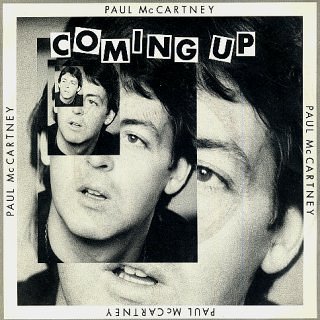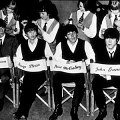- You know my name - September 11, 2010
- Everybody’s trying to be my baby - September 9, 2009
- Nothing to get hung about? - August 13, 2009
 MOLLIE WILSON REILLY • I’ve been thinking about Patti LuPone over at Restricted View, and I never think of Patti without thinking of Life Goes On, the TV series she starred in when I was growing up. Though the role was not officially a musical one, Patti did lead the cast in singing the theme song: “Ob-la-di, Ob-la-da.” It was bouncy and fun, and it was my introduction to the song. You won’t hear it on the DVDs — high licensing costs — but you can hear a really bad recording of it here.
MOLLIE WILSON REILLY • I’ve been thinking about Patti LuPone over at Restricted View, and I never think of Patti without thinking of Life Goes On, the TV series she starred in when I was growing up. Though the role was not officially a musical one, Patti did lead the cast in singing the theme song: “Ob-la-di, Ob-la-da.” It was bouncy and fun, and it was my introduction to the song. You won’t hear it on the DVDs — high licensing costs — but you can hear a really bad recording of it here.
Recalling it got me thinking about other Beatles songs used as TV themes. In adolescence I was also a faithful viewer of The Wonder Years, but I never knew “With a Little Help from My Friends” was a Beatles song until I bought Sergeant Pepper’s…, my very first Beatles album. The show used the Joe Cocker cover version (different cuts of it at different times; I remember it this way). Slow, soulful, Motown-y, it doesn’t bear much resemblance to the bouncy original, so when I heard “Billy Shears” singing those familiar lyrics I nearly fell over.
The only other example I can think of is Grace Under Fire, the blue-collar sitcom that starred standup Brett Butler and used Aretha Franklin’s version of “Lady Madonna” as the theme song for the first few seasons — until it got too expensive, I guess. And Google tells me Providence used this irritating version of “In My Life” — again, until finances interfered. Are there others I’m forgetting?
As the portion of airtime devoted to the show itself has been shrinking, few sitcoms have the luxury of a lengthy theme song these days. So we may have seen the last of the Beatles-song-as TV-show-intro. But they’re popping up in commercials all over the place! It seems almost quaint that the use of “Revolution” in a 1987 sneaker ad could have provoked an outcry. It was a simpler time. I will admit to being outraged by Chase’s recent use of “All You Need Is Love” in a credit-card ad, but for the most part I kind of enjoy hearing Beatles songs (and fun pop songs in general) popping up during commercial breaks. I particularly dig the impressionistic “Hello, Goodbye” by Sophia Shorai that Target is using in all its ads (like this one), and the “good buy” pun doesn’t really bother me, I guess because “Hello Goodbye” always sounded like a jingle to begin with. What do you think about all this? Is there a song/product pairing you’d like to see, or dread seeing? Could anything be worse than “All You Need Is Love” selling a credit card? I’m holding out for the day Kellogg’s makes a Corn Flakes spot using “Good Morning, Good Morning.” Then we will have come full circle indeed.





Love this post, Molls! I too dig the Target “Hello Goodbye,” and now that you’ve told me who sings it, I kind of want to see if iTunes has it & then download…something I’ve done in the past. No shame in doing that…
Corollary: There’s outrage when a commercial becomes a show. That’s right, I’m talking about the much maligned but actually really great CAVEMEN. Which has nothing to do with the Beatles.
Or does it??
http://www.imdb.com/title/tt0082146/
(Link to IMDB page for 1981’s Starr-starring CAVEMAN)
—Beatle Ed
I’ve never minded the use of Beatles tunes in sitcoms or movies, although it’s always pretty depressing to enjoy the snippets of song more than the entire film–here’s looking at ya, “Across the Universe.” Commercials, though, are another matter.
I like the Target version of “Hello Goodbye,” too, but isn’t that what jingle writers are for? Doesn’t OK Go, God bless them, need something to do? Using something as big and transcendent as The Beatles to create a positive affiliation with something as paltry and ultimately transitory as a corporation–here’s looking at ya, Bear Sterns–is deeply unBeatlelike. It diminishes them; a Beatles song in a commercial might as well be an ELO tune, or one by The Monkees. “Hello Goodbye” is indeed like a jingle, and that’s why it’s not considered one of their classics. Unlike the song it bumped to the B-side “I Am the Walrus”–if Target had used that, I’d be impressed!
The Beatles don’t need what advertising gives and any involvement with this dark art, IMHO, underestimates what’s at stake–one of the worst habits of our modern age. Whatever else it does, advertising trivializes; everything used to sell a product is brought down to the level of that product. We’ve conveniently forgotten this. That’s why, in 1964, Brian Epstein nixed the Beatle sanitary napkin, but a few years ago, Yoko Ono approved Lennon-branded condoms.
That was her right, and I think Lennon would’ve had a good laugh at it, but it’s not value-neutral. I’d like to pontificate for a bit if you don’t mind, so if you have something pressing, like lunch, or making a paper clip chain, feel free to stop reading.
People take advertising/marketing/promotion for granted now, but in the 50s and 60s, it was definitely seen as something new in our society, new and malign. People were threatened by it, worried about how powerful it was; they wondered if it would distort our values, degrade our politics, not to mention make us stupider and less happy. (Check, check, and check.) Artists railed against it–think of the Beats. Comedians lampooned it; MAD, for example, refused to carry ads. Back then, artistic expression was the opposite of marketing; it was individualist rather than mass, unique rather than endlessly reproducible, passionate rather than market-tested. What product could you sell with a Jackson Pollock? Drop cloths?
Then along came Warhol, who would rather switch than fight. He was immediately hailed as a genius. His embrace of promotion–his idea that it was part and parcel of artistic creation, as much “the point” as whatever was on the canvas–was portrayed as the new hipness. Who was calling him a genius? Who was lionizing this new hipness? The minions of advertising, publicity, and marketing. What a shock.
Warhol’s indeniably an icon, but if there’s any genius to him it was, IMHO, a simple willingness to capitulate, and deny the cost–to be commodified in exchange for fame. This tendency has scourged the art world ever since. I would argue that art means less to the average person now than it did pre-Warhol, simply because to succeed as Warhol did, you must hollow your art out to make room for the message, and this strikes at the heart of what audiences use art for.
To the degree that music resists commodification, it has retained its power. To the degree it has capitulated, it’s become meaningless. That is, in part, why twelve year olds still listen to Jimi Hendrix, and why punk still retains its vitality. By 1976, resistence to commercialism became so important, it even trumped sounding good.
You can’t damage Warhol by commercializing him, because the commercialization is the point. And that’s why, only twenty years after his death–he lived seven years longer than Lennon–Warhol has no more resonance to me than a logo. But using The Beatles in the same way reduces them; and it’s that extra thing that The Beatles still have and Warhol doesn’t anymore that makes an affiliation with The Beatles valuable to advertisers. They haven’t been stripped yet. Can they be? Should we as fans encourage people to try?
There’s a difference between Picasso and Warhol, just like there’s a difference between John Williams and Mozart; and our contemporary tendency to deny this shows just how confused we’ve become. What did Aaron Copland sound like before the Beef commercials? I don’t know, but I wish I did. I don’t want to think of beef when I’m listening to that; I don’t want to think of Nike when I hear “Revolution.” The pernicious thing is that advertising gives you no choice; once made, the association is there.
Part of what’s so special about The Beatles–maybe ALL of what’s so special about them–is how they made the leap from crap commercial culture to real art, and they did it even more successfully because they did it in reverse. The Beatles didn’t pull a Warhol, pooh-poohing artistic integrity in exchange for a faux-democratic but ultimately quite degrading vision of mass appeal. The Beatles achieved mass appeal by the rules of that game, then were eventually granted artistic integrity through the quality of their art. They were a genuine mass phenomenon that evolved into important artists. Genuine. Authentic. Real.
Lennon once called the group “a Trojan Horse,” and that’s absolutely true in this case; they used the apparatus of commercialization to promote and sell a very personal, non-standardized, non-reproducible vision of the world, song. by song By doing this, The Beatles demonstrated that it wasn’t necessary to sell out to be successful–you just had to be really, really good.
So maybe the question shouldn’t be, “Should Target use ‘Hello Goodbye’ in a commercial?’ but ‘Forty-one years later, why haven’t we come up with something better than that?'” Could it be the impoverishment caused by commercialization? Is constant manipulation doing things to our imagination?
The transaction isn’t just one way, Beatles giving sparkle to product. As great as they are, the songs are not indestructible; when Yoko licenses another Lennon product, she keeps her husband’s memory alive–but also makes that memory seem a little less worth remembering. I think that, in the end, was why the Lennons’ campaigning for peace never amounted to much–they believed that the mechanism of publicity was completely value-neutral. In fact the way you publicize something impacts what you’re publicizing quite profoundly. Their message, no matter how sincere or heartfelt, came off as self-aggrandizing and infantile because that’s what publicity does. A slogan does not replace a coherent political philosophy; a bed-in is not the Selma march.
I know this comment isn’t cool–it’s still much hipper to accept the whole process of selling people and being sold yourself as a given, and even cooler to embrace it (hence every popular artist’s public attempt to “subvert” it–which, if our current ad-saturated state is any guide, has never once been successful). The cool thing is to say that you’re so wised-up that none of that crap works on you–but it does, on all of us, and the quicker we recognize its power, the sooner we can maximize the good things it can do and limit the bad stuff. Until then, I think any Beatle association with advertising is a losing proposition for the boys from Liverpool. We won’t know what we’ve lost until it’s much too late to get it back.
I love reading your comments on this, Mike, and commercialization is one of the trickiest issues in pop culture (or poop couture, as it may often, with justice, be called). I agree or at least am given pause by much of what you say. I’m also, I think, in fundamental disagreement with a lot of it. That doesn’t mean you’re wrong, just that I decided a while back to take a different perspective.
This is a link to a piece I wrote for “The American Prospect” a few years ago, that touches on the Beatles and a lot of other artists who by design or surprise find themselves in TV commercials:
http://www.prospect.org/cs/articles?article=thats_like_hypnotizing_chickens
Re-reading it after all this time, I find myself in accord with my (slightly) younger self. But maybe that’s my Peter Pan complex.
All that said, I have yet to hear a TV-ad Beatle-cover that did not make me feel vaguely nauseous, as if I had a stomach full of those pink-cotton-candy Quackers or whatever the hell they’re called. I cannot share Beatle Ed’s unaccountable enthusiasm for that “Hello Goodbye” thing for Target (or Tar-ZHEHHH, as we say in Iowa), and the “Getting Better” snip for Philips TV (?) 2-3 years ago was downright despicable: sounded like a guy on downers gargling tobacco juice the morning after a party.
Poop couture plotzes again.
I hated that “Getting Better” cover too. I don’t remember the product, but I well remember the ad. The cover annoyed me mainly because it was so faithful — the artist/vocalist/hired hack didn’t do anything interesting with the song, aside from subbing in a really unpleasant lead vocal, and so it sounded like they figured, Eh, we can’t use the original, so let’s just try to create something that sounds very much like it. (There was a similarly irritating “Catch the Wind” ad running recently.) I like the “Hello Goodbye” Target ads by comparison, because they at least feature an interpretation of the original, instead of just an imitation. There was also a holiday-season ad — for Macy’s, I think? — with a funky “From Me To You,” if I remember correctly. So I’ve taken that as a sign that Beatles covers in ads are, if you will, Getting Better.
I’m not thinking about this very ideologically (although I knew I could count on Mike to pick up my slack) — I just know, on those increasingly rare occasions when I actually do have to suffer through ads in real time, I’d rather hear Feist and Weezer and Ben Lee than a bunch of earworm jingles.
[By the way, for those interested in the Pandoradipity phenomenon: just now, Pandora started playing a cover of “Across the Universe” — by David Bowie! My goodness.]
What about the Devo Target ads?
http://www.youtube.com/watch?v=ivNjRdqdbSw
If anyone gets away with Warhol-esque capitulation without hollowing out their art in the process, I think it might be them.
But maybe I’m being too easy on them?
considering all the other things happened in the 70s — economic vulnerabilities revealed, military supremacy trivialized, ethnic/racial unity rejected, cities gutted — various apparent monopolies smacked down — the audience changed, too.
No broad social commentary here… but I think the Target ads are some of the most stylish and best executed on TV. That being said, it broke my heart a tiny bit that my 8 year old referred to “Hello Goodbye” as “The Target song”. On the flip side, there’s actually a fair bit of music I’ve discovered *because* of commercials as of late, so maybe it’s a fair trade.
So I’ll just let her enjoy it, and see if I can’t get her to grip on to some actual Beatles CDs.
So today in a cab the little vid-screen had a commercial for Chase, scored to “Anytime at All.” (Anytime at all, you can use your Chase card to get cash.)
And: I didn’t mind.
Best line from an old Zippy the Pinhead: Something to do with Dylan’s “You Gotta Serve Somebody” being used to shill for KFC.
Me? Ideological? 🙂 By the way, I enjoyed your article, Devin–thanks for pointing me to it.
Keep in mind that built into my position is the knowledge that Beatles songs will continue to be used in advertising, ever more frequently I’d suspect. It’s a simple matter of dollars versus principles, and since principles can’t be measured (and don’t pay the rent), they usually lose. The only people with sufficiently powerful feelings about it might be the surviving Beatles, and they’re not making the decisions anyway.
The reason that I am passionate about this issue is simple: I’ve seen what’s happened to comedy, which is the business I know most about and worked in until recently. Comedy had an explosion of artistic progress from about 1955 to 1980. It followed the path of rock and roll, only about five years behind. As with rock, comedy’s artistic leap forward was born in the most intimate, individual-focused (which is to say noncorporate), anti-commercial settings—stand-up, improv theater. It gathered strength in the publishing world, but only in circulation-focused, subscriber-driven magazines not supported by advertising. Everywhere, the new comedy’s popularity was built on forms of access that required a minimum of corporate control: live appearances and record sales. This allowed the comedy to serve no masters but what was funny; people could say, write, and perform whatever they wanted, and what they performed was based on their perceptions, not the stylized world of show biz. Think Mort Sahl, Lenny Bruce, MAD, The Realist, Second City, underground comics.
Because it was authentic, and talked about all sorts of areas that show biz ignored, lo and behold, this type of comedy became hugely popular. Eventually so popular that the gatekeepers—the corporations funded by advertising bought by other corporations—felt they needed to reach the audience of this new comedy, one because it was big, and two because it was seen as authentic. Authenticity is a huge advantage when you’re trying to manipulate somebody. So the corporations struck a deal: if you let us mix our corporate, commercial message in with your individual, artistic one—if you let us put cigarette ads in-between the articles, or 30-second spots between the sketches—we will give you access to even more people. Naturally the comedy folk said yes, because the only thing better than getting laughs is getting more laughs. Access is their Achilles heel.
For a while, the new comedic institutions formed by this deal (National Lampoon, SNL) thrived; as long as they remembered that the advertisers’ goals were not their goals, as long as they were in it, but not of it, they could still provide the kind of comedy that made them popular. But issue-by-issue, show-by-show, the pressure came down—not just negative pressure like advertisers pulling ads, or censors axing sketches (although those things happened), but positive pressure, too: see what you can do and buy with the money these corporations are giving you, just for running their message. Is that so bad? You can still say what you want, mostly, and everybody needs to make a living…
Bit by bit, the material was changing, growing less personal, less quirky, more standardized, more corporation-friendly. National Lampoon in 1978 is markedly different than it was in 1974; SNL’s style is markedly different in 1979 than it was in 1976. In 1974, Richard Pryor was the heavyweight champ of stand-up; in 1978, it was Steve Martin.
By 1980, the feedback was going in both directions: not only were the corporate-controlled routes of access changing the material, the people going into the business started to change, too. It’s very important to keep in mind that the people who were creating comedy in 1965 had learned by watching those who’d done it in 1955; so the underground comics of the 60s come from Mort Sahl and MAD. Similarly the ones coming of age in 1980 had modeled themselves on those who’d done it in 1970—but with one important difference: because the people in 1970 had been allowed to reach a mass audience (and gotten rich in the process), that was now part of everybody’s expectation. The money and access provided by advertising had become just as important as the comedy. And of course it would; comedy people are not monks, and everything in our current culture pushes one towards taking the cash, for a million different reasons. To get what they want, all the big boys have to do is put a pile of money on the table and leave the room; you’ll do the rest. And the know that.
To avoid feeling like hypocrites (especially when compared to their ad-hating forebears) comedy people since 1980 have cultivated the stance that one, ads are simply a fact of life, two, who controls access to the audience doesn’t matter, and three, anybody who thinks differently is dreary and old-fashioned. But the material tells another story. Classic National Lampoon is about politics and literature; classic Spy is about celebrity. SNL circa 1975 is political and social satire; SNL circa 1985 is absurdist humor, catchphrases, and showbiz.
There was a change, and it was consistent—a short period of time after leaping into bed with advertisers, the comedy changes, and then it has stayed roughly the same after that. And you could make the exact same case with rock music. I don’t like this conclusion any more than the rest of you do, because I like to laugh and I like great tunes, and I want our culture to be as good as it can be, purely for my own selfish enjoyment. But if one detaches from the conventional wisdom and actually interacts with the material, it’s obvious. “Twas ever thus” is only defensible when it’s true; otherwise, it’s just a way to make yourself feel better about something that’s not as good.
I accept advertising, marketing and promotion as a way of modern life, just as I do the modern corporation. I don’t have any better ideas on how to organize our society. But neither do I think that we should go limp in the face of all this, or say that it’s only positive. I think it’s essential for those who care to try to discern, if only to protect things that are essential yet do not thrive under this system. Perhaps someday there will be nothing but Mort Sahl and Belushi-era Second City out there; I doubt it, but it’s possible. At that point I hope I’d be championing the Jack Handeys and Seinfelds and writers of slight, harmless, amusing list pieces.
Do you ever wonder why we are drowning in satire, yet feel nothing but despair about our politics? Do you ever wonder why written comedy is increasingly twaddle, Journeys to the center of the writer’s mind, crossword puzzles for the overeducated? Do you ever wonder why stand up is more profane and explicit than ever, yet it all sounds the same? Comedy is sick, and it’s sick because it has been so infected with the ideals of advertising, marketing and promotion that it no longer has any idea what is real, human, and funny. I say this not because I want to, but because I’m tired of the callowness, and easy vulgarity masquerading as courage. The Onion, beautifully written and exquisitely observed, looks at the world from the highest pinnacle of prosperity and education ever attained by humanity and says, “Eh—isn’t really worth much, is it?” SNL trundles on, educating yet another generation of 12-year-olds that show biz is the only thing worth thinking about. And there are armies of stand ups out there, hoping that their observations about cunnilingus—as common and impersonal as a mother-in-law joke—will be the springboard to Valhalla, their very own sitcom.
So what does this have to do with running Beatles songs in commercials? Nothing, and everything. As I said in my original comment, I know mine isn’t the intellectually approved response, especially in this era when tenure is more easily received via a career studying, say, the semiotics of advertising rather than Dante or Vergil. But I have eyes and ears, and I can read, hear and laugh, and I ain’t buyin’ it. There’s a difference between what’s built to be ephemeral and manipulate, and what’s designed to be essential and inspire. Both things have their place, but they’re not equally important, much less the same. And we’re drowning in one, and desperate for the other.
I can’t make American comedy any better, just like I can’t make people quit using my positive associations with The Beatles to make me pay attention to fucking JC Penney. But I don’t have to give them “real love,” or indeed any love at all. If you can, more power to you. You are better adapted to this life of urs than I am, and I envy that.
What financial entity was it that used the Spinal Tap song “Gimme Some Money” on their ads last year? Was that also Chase? I could never decide if I thought that was clever, or the end of cleverness as we know it.
Film made the same transition in the late 70s. Jaws in ’75 and Star Wars in ’77 invented modern movie marketing and tie-ins, and killed auteur filmmaking, which was hitting its high poin in the mid-70s. Or if not killed it, pushed it out of wide-circulation studios into the corner.
But I wonder if film and comedy and pop music were collapsing under the weight of their own self-indulgence anyway. You could say that the runaway indulgence of Apocalypse Now, the highwater mark for the film school guys, did as much to kill it as Lucas’ corporate tie-ins.
That’s a fascinating point, T. I see what you’re saying. And I don’t think you’re being too easy on them.
What Devo might be is–and they would love this–a mutation. Think of corporate commercialization as a form of radiation; it kills most artistic expression, but what Devo expresses, and how it’s expressed, survives intact. Whatever you want to call Devo’s aesthetic, it’s immune. That’s a cheery thought.
Just saw the Chase commercial again (flipping through channels) — it doesn’t make sense: “all you have to do is call”?
AmEx did the “Gimme Some Money” ad!
http://www.youtube.com/watch?v=uLYk0CgxQbM